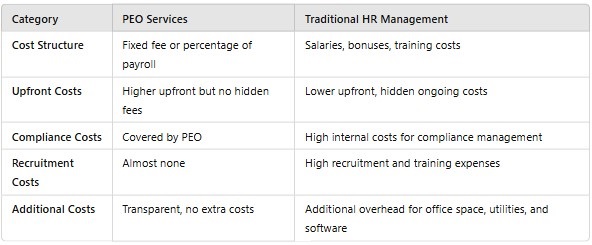Human resources (HR) are vital to every organization. They manage recruitment, employee benefits, payroll, and ensure compliance with local labor laws. Choosing the right HR model is crucial for maintaining a productive and legally compliant international workforce. Among the options available, businesses must decide between a Professional Employer Organization (PEO) and traditional HR management.
Table of Contents
PEO vs. Traditional HR Management
A PEO is a co-employer, meaning they share HR responsibilities with the business, handling payroll, employee benefits, and compliance. This comprehensive model can be particularly advantageous for companies looking to expand globally without establishing a foreign entity. For example, a PEO in Dubai offers expertise in navigating local labor laws and regulations.
On the other hand, traditional HR management involves an in-house HR team managing all functions such as recruitment, payroll, and compliance. This model requires more resources and expertise to effectively manage these responsibilities while ensuring alignment with business objectives.
Cost Components of PEO Services
PEO services come with various costs, including:
- Administrative Fees: These costs, which are often assessed as a percentage of the total payroll or as a fixed price per employee, cover services like benefits administration and payroll processing.
- Shared Liability and Risk Management: PEOs help manage legal and financial risks, including workers’ compensation, unemployment claims, and compliance, mitigating the risk of costly fines and lawsuits.
- Economies of Scale in Benefits Procurement: Due to their large client base, PEOs can offer competitive rates on employee benefits, making it easier for small and medium-sized enterprises (SMEs) to provide benefits comparable to those of larger companies.
How Does PEO Pricing Work?
PEOs typically offer pricing models such as:
- Flat Fees: A fixed monthly fee per employee for all services.
- Percentage of Payroll: A percentage of the total payroll, often ranging from 2% to 15%.
- Per-Employee Fees: A monthly fee per employee, with pricing varying based on location and service level.
Factors Influencing PEO Costs
Several factors impact the cost of PEO services, such as company size, industry-specific needs, location, and the required level of service.
Cost Components of In-House HR Management
In-house HR departments involve:
- Salaries: Paying HR personnel’s salaries, which increase as the team grows.
- Benefits: Offering HR staff the same benefits as other employees, including health insurance and retirement plans.
- Software: Investing in HR software for payroll processing and compliance management.
- Training and Compliance: The need for ongoing training in areas such as labor laws and employee relations can increase overall HR costs. Additionally, businesses must manage the risk of compliance violations.
Comparative Analysis: PEO vs. In-House HR

Which Option Is Best for Your Business?
PEO services are ideal for startups and SMEs looking for cost-effective HR solutions, especially when expanding globally. Larger, well-established companies with more resources may prefer in-house HR management, though they can also benefit from PEO co-employment for specific HR functions.
PEOs: A Cost-Effective Solution
PEOs offer an affordable way to outsource HR tasks while ensuring compliance with local laws. By using their services, businesses can focus on core functions like marketing and operations while offering competitive benefits to employees.
Partnering with a PEO in Dubai
For companies expanding into Dubai, PEO services can simplify HR management and compliance with local labor laws. Connect Resources, a trusted PEO provider in the UAE, offers tailored services to address recruitment, payroll, and risk management needs for businesses operating in the region.
Conclusion
The choice between PEO services and traditional HR management depends on your business needs, budget, and goals. SMEs and startups should consider PEOs to streamline HR functions and manage global expansion effectively. For larger organizations, in-house HR may be suitable, but partnering with a PEO for specific functions can still provide significant benefits.

